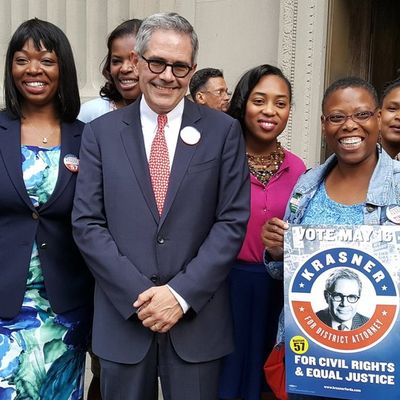
It’s been a rough week (and/or month, and/or year) for those who want to see criminal-justice reform at the federal level. Five days ago, Attorney General Jeff Sessions ordered federal prosecutors to push for the most serious charges — and longest possible sentences — against drug criminals, even those of the nonviolent, low-level variety. And this afternoon, the Trump administration made Sheriff David Clarke Jr. — a man who has called for rounding up the “hundreds of thousands” of ISIS sympathizers living in the United States and imprisoning them indefinitely, without trial — as an assistant secretary in the Department of Homeland Security.
This reversion to “tough on crime (and/or the politically powerless)” policies represents an abrupt turn of the political tide. Before Donald Trump launched our long national nightmare in June 2015, there was a growing bipartisan consensus that America’s criminal-justice system had become overly punitive. African-American activists were mobilized by the events in Ferguson; fiscal conservatives in state legislatures were desperate for fat to cut; the opioid crisis was popularizing the idea of drug addiction as a disease in large swathes of white America; and libertarian billionaires were drawn to the prospect of using federal criminal-justice reform as a cover to gut the enforcement of white-collar crime — and collect favorable press in the process.
The arc of history was bending in the general direction of justice. Crime rates were hovering near historic lows in most of the country. The exceptions were disadvantaged neighborhoods in a few major cities, where reactionary criminal-justice policies boasted little support. There was little reason to suspect a hard right turn was coming.
And to no small degree, that turn was an aberration. True, the Black Lives Matter movement (like every challenge to illegitimate authority brought by a marginalized group) was bound to inspire some amount of reactionary backlash. Nonetheless, Trump was the only GOP candidate to make loud noises about law-and-order, and even he didn’t spend much energy extolling the virtues of the war on drugs. The Trump Justice Department’s far-right orientation is less a product of renewed support for draconian sentencing, than it is of Jeff Sessions’s decision to hop on the Trump train at an early date.
On the local level, reformers’ momentum has continued apace. Even as Trump rode his revanchist message to the summit of American politics, reform candidates ousted tough-on-crime, incumbent prosecutors from Mississippi to Florida to Louisiana. And last November in Illinois, Kim Foxx won control of the nation’s second-largest prosecutor’s office on a platform of leniency toward nonviolent offenders, increased funding for efforts to reverse wrongful convictions, and the reallocation of resources toward combating violent gun crime. Meanwhile, in Harris County, Texas, the newly elected Democratic district attorney Kim Ogg has ceased prosecuting anyone for possession of four ounces or less of marijuana.
And Tuesday night in Philadelphia, reformers won their most audacious victory yet.
Larry Krasner is a former public defender and civil-rights attorney, whose clients have included activists affiliated with Occupy and Black Lives Matter. And last night, he became the district-attorney-in-waiting of America’s fifth-largest city.
In a seven-way Democratic primary race, Krasner captured 38 percent of the vote — nearly twice the support of his closest competitor — in a race that saw unusually high turnout. In the deep-blue city, the donkey party’s nomination all but guarantees him victory this fall.
Philadelphia has not, historically, been a bastion of progressive criminal-justice thinking. We’re talking about the city that once dropped a bomb on its residents, and where Lynne Abraham held the DA’s office for four terms on the strength of her enthusiasm for capital punishment.
And Krasner is no pseudo-reformer. The man has more experience suing the police than prosecuting criminals (he has no experience with the latter) — and campaigned on promises to abolish the death penalty, cash bail, and civil asset forfeiture. In February, the president of Philadelphia’s Fraternal Order of Police called Krasner’s campaign “hilarious.”
Krasner’s election promises to bring significant changes to how law-and-order is upheld in the City of Brotherly Love. But there remain profound limits on what progressive prosecutors can achieve without broader legislative and institutional support, as The Atlantic’s Maura Ewing explains:
DAs have a tremendous amount of discretion in shaping what law enforcement looks like in a city: deciding who is put on trial; making plea deals; and suggesting bail amounts, punishment, and length of sentencing, where applicable … But DAs nationwide face significant barriers to carrying out a reformist agenda, in large measure due to the broader justice system. They don’t work in isolation, but rather in concert with law enforcement, other political offices, and the other arms of the judiciary. The big-ticket items that Krasner and other prosecutors have campaigned on — reforms of asset forfeiture, bail, and the death penalty — are not entirely under a DA office’s purview. That’s not to say that DAs can’t make significant and swift changes: They can move to divest their offices from asset-forfeiture revenue, advise that certain types of defendants aren’t held on cash bail, or refuse to use evidence obtained through stop-and-frisk techniques.
But the kind of deep and lasting change that reformist DAs like Krasner promise comes through shared vision and cooperation with other offices and agencies that may not actually exist.
Nonetheless, Krasner’s victory is a much-needed reminder: Just because we’re living in Trump’s America, doesn’t mean you need to live in his city, county, or state.
Go local, young progressive.






























